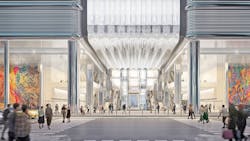PANYNJ, FTA sign final environmental impact statement for replacement of Midtown Bus Terminal
The Port Authority of New York and New Jersey (PANYNJ) and the Federal Transit Administration have signed the final environmental impact statement (FEIS) for the replacement of the Midtown Bus Terminal. The signing is a major step toward a federal record of decision on the project that is anticipated to be issued in the near future. The issuance of the project’s final environmental impact statement followed a final round of public hearings held earlier this year that yielded more than 700 public comments.
“Signing the final environmental impact statement brings us closer to finally replacing what’s been a commuters’ nightmare for decades with what will be a beautiful, efficient new bus terminal that will be the world-class gateway our region deserves,” said PANYNJ Chairman Kevin O’Toole. “A magnificent new Midtown Bus Terminal will knit together New Jersey and New York to create an even stronger, more economically vital and easily accessible region.”
“The final environmental impact statement is a critical milestone in our plans to replace the worst infrastructure eyesore in the nation with a new best-in-class bus terminal befitting this region that will serve commuters for the foreseeable future and that will energize the vitality of the community neighboring the bus terminal,” said PANYNJ Executive Director Rick Cotton. “We thank the Federal Transit Administration for carrying out the environmental review so thoroughly, collaboratively and professionally. We look forward to a record of decision in the near future that will help unlock potential federal support for this critical infrastructure project.”
In addition to the federal environmental review, the Midtown Bus Terminal replacement project is proceeding through New York City’s land use review process. The new Midtown Bus Terminal will replace the existing 74-year-old, functionally obsolete and rundown terminal with a new facility. PANYNJ notes the new terminal is designed to meet projected 2040-2050 commuter growth, provide a best-in-class customer experience that serves the region’s 21st century public transportation needs and dramatically enhance the surrounding community.
The $10 billion facility will include a new 2.1 million square-foot main terminal, a separate storage and staging building and new ramps leading directly into and out of the Lincoln Tunnel. The project plan — including a proposal for the permanent closure of a portion of 41st St. between 8th and 9th ave’s., a central main entrance, more street-level retail and a multi-story indoor atrium and new public open space — will enhance both the commuter and community experience terminal. The project is expected to create approximately 6,000 good-paying union construction jobs.
PANYNJ's plan for the Midtown Bus Terminal replacement reflects public feedback from extensive community outreach, including input from New York City, commuters, local community boards and elected officials in both states. The FEIS has been prepared to permit construction of a full three-part building plan, which includes a new main terminal, a storage and staging facility with new ramps directly into the Lincoln Tunnel and deck-overs that will be converted to publicly accessible open space once the terminal is completed. The project also includes a wide array of community benefits, including:
- Added capacity to allow curbside inter-city buses that currently pick up and drop off on city streets surrounding the bus terminal to move their operations inside the bus terminal and off the streets.
- The creation at the end of construction of 3.5 acres of publicly accessible green spaces on PANYNJ property by decking over the currently below-grade Dyer Avenue “cut” and building open space on top of the new deck-overs.
- New concessions and retail amenities that will be accessible from the streets in the community, as well as from inside the bus terminal.
- The construction of significantly improved and attractive facades, enhancing the visual quality of the new bus terminal to become an asset rather than an eyesore to the surrounding neighborhoods, including an iconic atrium entrance on 41st St. and 8th Ave.
PANYNJ notes the new bus terminal will be built for the future and designed to achieve net-zero emission goals, serving all-electric bus fleets and implementing 21st century technology at every turn. The agency notes a traffic management system — including sensor-based monitoring systems — will enable quicker, smoother movement of buses into and out of the new terminal and provide remote monitoring of bus engines to reduce breakdowns in express bus lanes. The building will also include visionary sustainability and resiliency measures, from LEED certification and clean construction to renewable energy, zoned heating and cooling systems and heat recovery and reuse technology.
PANYNJ’s construction plan for the new bus terminal is being developed in close collaboration with New York City partner agencies, with input from carriers, customers, the local community, world-renowned engineering and construction experts and innovative architectural and design firms. The proposal eliminated the taking of private property, as it would be built on existing PANYNJ property stretching as far west as 11th Ave.
The project is expected to be constructed in phases, with a temporary terminal and new ramps completed in 2028 and the new main terminal completed in 2032. Current plans provide for a phased construction approach with the staging and bus storage facility to be built first so it can serve as a temporary terminal while the existing terminal is demolished and rebuilt.
